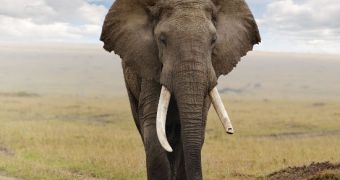Last year, poachers in Africa tracked down, killed and butchered 22,000 elephants, a new report issued by the UN earlier today says.
What's interesting is that, according to this report, poaching rates are significantly higher in Central Africa than they are across the rest of the continent.
Specifically, it appears that twice as many animals are killed and stripped of their horns in Central Africa than they are in other regions.
The World Wildlife Fund tells us that, as a result of these very high poaching rates, Central Africa has lost almost two-thirds of its elephant population over the last 10 years.
Unless measures to end poaching are implemented as soon as possible, the region risks losing all its elephants sooner than one might expect.
“Wildlife crime is a serious global security issue and participation by all countries is required to stop it. In many places improvements are needed in regulation, enforcement, transparency, resourcing and transnational collaboration,” stresses Lamine Sebogo, WWF International’s African Elephant Programme Manager.
The same source tells us that, as shown in a TRAFFIC report, most of the ivory taken from elephants killed by poachers sooner or later end up in China. Thus, the country is considered to be the top destination for illegal ivory.
The good news is that, although it is true that last year's poaching rates in Africa are worryingly high, they are actually lower than the ones documented back in 2011.
Specialists detail that, two years ago, a total of 250,000 elephants were slaughtered on this continent. The recorded drop in poaching rates can and should be seen as a result of the fact that ever more countries are becoming actively involved in ongoing efforts to end the illegal wildlife trade.
As Lamine Sebogo puts it, “High level commitments to action against poaching and smuggling are beginning to have an impact, but Central Africa’s endangered forest elephants remain in peril.”
High officials attending summits scheduled to take place later this week in Botswana and Paris are expected to come up with new and better ways to keep elephants safe from poachers and curb the global illegal trade in their tusks.

 14 DAY TRIAL //
14 DAY TRIAL //